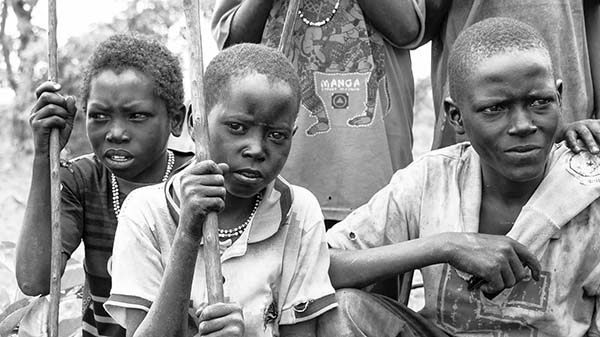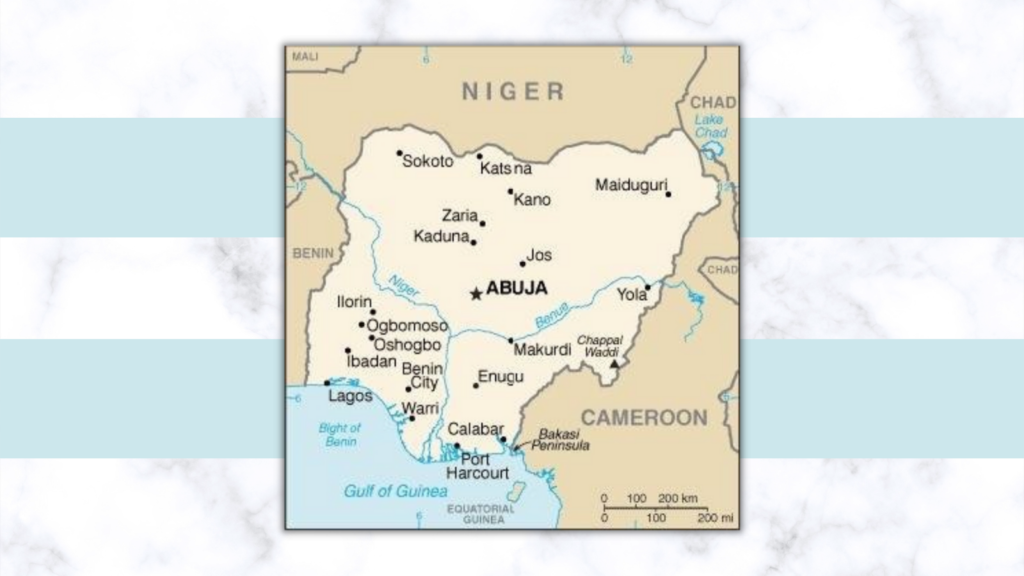While some religious freedom advocates characterize the violence in Nigeria in very black-and-white terms — nothing short of Muslim persecution of Christians — a Southern Baptist representative who has seen it firsthand says it is more complicated.
“It’s a very complex environment,” said Alabama-based representative Daniel Smith, who with his wife, Donna, just marked their 15-year anniversary on the missions field, all but one year of it in Africa.
“Christianity and Islam certainly are factors,” Smith said in a recent interview with TAB Media. “But it tends to be a little bit more nuanced.”
Regardless of the trigger for the incidents, the only solution is forgiveness, he said.
Cycle of violence
“The problem in Nigeria is it’s just a cycle of violence,” Smith said. “It just spirals out of control. The only real tangible thing to do is to turn the other cheek and make positive steps to show love to the people who have hated us.
“I’ve been working with a number of local Baptist leaders there whose villages have been attacked by mercenaries — homes, churches and clinics burned to the ground, lootings, rape, murder,” Smith said. “We’ve worked with Send Relief and local partners to write project requests to provide not only humanitarian and food relief, but also to rebuild homes, buy sewing machines, buy grinding machines and so on, so people could rebuild businesses.
“We conduct trauma healing workshops, walking victims through a biblically based program that will help them to find healing and forgiveness and eventually move on with their lives. And we’ve been getting the local leaders to work with the people and build in ways that they can actually minister to the communities that sponsor those attacks.”
The Smiths returned to Alabama in April, having spent the previous year in Nigeria. The Smiths began their missions career in Nigeria and hope to return there in the near future.
“We started off in Nigeria when we were just a couple with no kids,” he said. “We lived in a little mud hut with no electricity or running water, farming by hand, getting up to the sound of bleating goats in the morning.”
After those first few months in Nigeria, the Smiths were sent to France to study French so they could serve in French-speaking West Africa for the next 13 years.
When they returned to Nigeria last year, the Smiths saw much of the same poverty and violence that had plagued the country nearly a decade and a half earlier, only more so.
Smith said representatives must be much more careful now when they travel, going to villages only in daylight and not staying too long.
“There’s too much chance that you would be an easy target. Every time we travel on the roads, we give a very passionate prayer for safety,” he said.
Although Nigeria is Africa’s most economically important nation — blessed with significant oil reserves and international businesses — the abject poverty suffered by most of its citizens and the intense competition for resources are key drivers in the pervasive violence plaguing Nigeria.
“The violence and banditry are not usually motivated by religion,” Smith said. “The bandits will often target Christian leaders because they know that their churches will pay. There are kidnappings all the time of pastors and pastors’ wives. These bandits will kill people who don’t pay up. That makes being a Christian minister in Nigeria a very risky proposition.”
Constant fighting
Villages often hire mercenary soldiers — typically unemployed or under-employed angry young men — to kidnap people for ransom or seize territory or property, he said.
Herders fight farmers. Muslim tribes attack Christian tribes, and vice versa. Fulani herdsmen — a predominantly Muslim group blamed for a recent spate of violent acts committed against Christians — are often “getting a bad rap” in news media accounts for religious persecution when the fight can actually be traced to longstanding personal grudges unrelated to faith, Smith said.
Still, religious ideology is a wedge sharply dividing Nigerians and pitting region against region, neighbor against neighbor, father against son.
An either/or choice
Nigerian tribes typically adopt either Christianity or Islam exclusively, Smith said, and battles erupt “because some girl marries into the wrong family, say a Christian girl marries a Muslim and is forced to convert.” Such religious conversions, Smith said, can provide “the impetus for absolute mayhem.”
Nigerian Christians are not without sin in all this, he said.
“The Christian community shuns these Muslim-background people because they’re Fulani,” Smith said, and recalled hearing one Nigerian Baptist minister in an official public meeting casually saying some “horribly racist” things about the Fulani.
Despite the dangers, Smith said, “There is a movement of people coming to Christ among the Fulani. It’s very underground. They are typically abandoned and persecuted by their own family. It’s common for physical violence to be done to them by somebody close to them.”
The viciousness of such violence can be “jaw-dropping,” Smith said. He recalled meeting with a group of Nigerian Christian converts sitting around in a circle. Without fail, each one told a story of something horrible done to him or her at the hands of that person’s own family.
“I met a guy who had a big scar right across his forehead because his dad or his brother attacked him with a machete,” Smith said. “He survived and is doing great things for the Kingdom.”
EDITOR’S NOTE — Names have been changed for security reasons.
________________________
Nigeria critical link between Africa and the world, watchdogs say
Policymakers and news media are loath to view ongoing violence in Nigeria as religious persecution, instead framing the conflict as cultural or even the result of poverty and famine due to global warming.
That’s according to Lela Gilbert, a senior fellow for International Religious Freedom at Family Research Council, a fellow at the Hudson Institute’s Center for Religious Freedom and author of a recent FRC report on Christian persecution in Nigeria.
Violence on two sides
Last December, the U.S. State Department reported that the Secretary of State had placed Nigeria on the Special Watch List “for having engaged in or tolerated severe violations of religious freedom.”
However, in that same report, the State Department cited Nigerian government persecution against both Muslims and Christians and generally framed the violence as something perpetrated by both sides — a tit for tat between Fulani herders and Christian farmers competing for resources.
The U.S. has addressed the violence primarily through diplomatic dialogue, interfaith dinners and conferences, and sponsoring training sessions for journalists “to help reduce bias in their reporting and prevent tensions from becoming further inflamed.”
But less talk and more action are what’s needed, contends Gilbert, who is pushing for cuts in foreign aid and other U.S. sanctions against the Nigerian government, which has done little to stem the violence or protect Nigerian Christians.
It is in the interest of not only Christians but also the world at large to pay attention to what’s going on in Nigeria.
Despite the abject poverty that 40% of Nigerians endure — especially Christians who are denied many jobs and resources because of their faith or are forced out of their homes and off their land — Nigeria is Africa’s premier economic powerhouse. The country is geographically immense, rich in petroleum reserves and involved in extensive global enterprises.
Africa’s bellwether
Eventually, Gilbert warns, the events scarring Nigeria will impact the rest of the world.
To illustrate that, Gilbert quoted well-known singer and human rights activist Bono, who in 2016 commented, “There’s so much strategic importance in Nigeria — that’s why it’s odd that there’s not more focus on what’s happening. It’s pathetic. If Nigeria fails, Africa fails. If Africa fails, Europe fails. And if Europe fails, America is no longer America.”
________________________
How to help persecuted Nigerian Christians
How can you help persecuted Christians a world away in Nigeria? Here are some suggestions from religious freedom advocates.
Pray (Open Doors USA)
Pray for Christians who live under constant threat of attacks by Islamic extremists. Ask God to protect them and give them hope and peace.
Pray for Fulani militants and other extremist groups like Boko Haram. Pray that God will touch their hearts with the truth of the gospel.
Awareness matters
Pray for pastors and church leaders who are helping rebuild communities and restore their churches after violent attacks.
Activate and Educate (Lela Gilbert, Family Research Council)
Contact U.S. government officials to urge sanctions and the appointment of a special envoy to Nigeria, a move that would improve documentation of violent acts against Christians and spur more concrete action from the U.S. government.
Educate others about the situation in sermons, through speakers and in articles for local newspapers, church newsletters and social media.
Stay informed (current news and recent analysis)
Morning Star News — morningstarnews.org/region/sub-saharan-africa/nigeria/
World Watch Monitor — worldwatchmonitor.org/countries/nigeria/
Family Research Council — frc.org/issueanalysis/the-crisis-of-christian-persecution-in-nigeria
U.S. State Department — tabonline.org/nigeria-report
Click here to read more about violence against Christians in Nigeria.






Share with others: